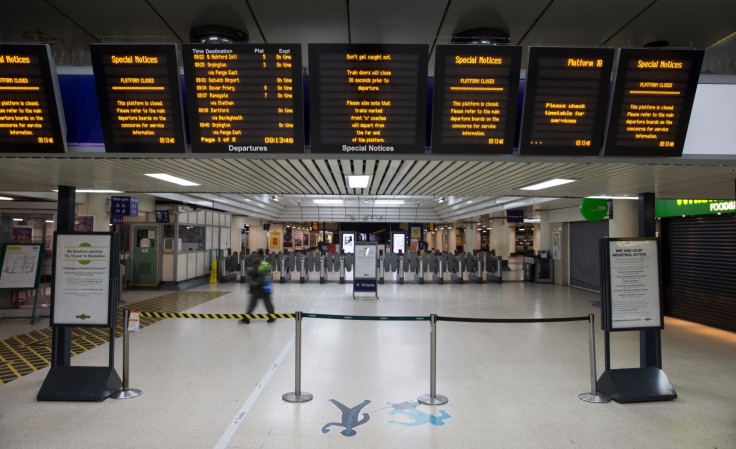Don't complain about strikes this Christmas – we all need stronger trade unions
Inconvenience doesn't warrant 'emergency laws' which would curb one of the few rights workers still have.

Trade unions are "running rampant", declared the Daily Telegraph front page on Sunday. This has become a familiar theme over recent years. Perusing the newspapers, you would think that donkey-jacketed gangs of militant workers were bringing the country to a grinding standstill, when in reality the number of days lost to industrial action is at a record low. A few days' inconvenience over the Christmas period supposedly warrants "emergency laws" which would curb one of the few rights that workers still have left – the right, enshrined in numerous international treaties, to withdraw their labour.
Indeed, the idea that in Britain the balance has swung too far away from bosses and towards trade unions is far-fetched to say the least. Recent scandals involving companies like Sports Direct and JD Sports ought to have drilled that point home by now. At many of the warehouses which service some of Britain's familiar high street names, workers are being sacked for everything from falling sick to taking too long going to the toilet.
In this spartan world of distribution sheds and call centres, often situated in once proud industrial heartlands, a contract is as rare a thing as a precious stone – as are trade unions. One care worker I spoke with recently told me that she had had to hide the fact that she was a member of Unison from every big company she'd worked for. If they even got wind of the word "union" she'd be out, she told me fearfully.
Nor are meaningful workplace struggles a relic of the past, like penny farthings or bread and dripping. A recent study from Manchester University found that countries with a stronger culture of collective bargaining tended on average to have higher minimum wages.
Thus the world depicted on the front pages of newspapers like the Telegraph – of bosses cowed by militant unions – will be one that most workers in Britain are unfamiliar with. Not only are fewer days lost to strikes today, but there are far fewer trade unionists. Trade union membership is almost half of what it was at its peak in 1979. And this has had knock-on effects in terms of who gets which slice of the pie.
GDP may have grown significantly over the past 30 years, but the labour share of it is as small as it was back in the 1930s. British workers are also experiencing the longest decline in real wages since 1864. Against this backdrop, try to imagine what it must be like to believe that Britain's mounting problems are caused by rampant trade unions.
Trade union membership is almost half of what it was at its peak in 1979.
In reality of course, it isn't that right-wing newspapers or Tory MPs genuinely believe that trade unions are bringing the country to its knees. Their real problem is that unions invariably crash up against the interests of the people and organisations that the Tory Party and the right-wing press were set up to defend.
"Interests" is the operative word here. Indeed, the casual talk of a "post-truth" or "post-fact" politics that is ubiquitous at the moment risks obscuring a more fundamental truth: that politics is not simply about who is in possession of the "facts", or who has the biggest spreadsheet. It is fundamentally a clash of interests. Contrary to what many liberals appear to accept as de rigueur, there is no glorious middle ground where people can generously put aside their differences as soon as they are in possession of the sacred tablets documenting "The Truth".
Digressing slightly, last week I visited Merthyr Tydfil, a town which, like so many others in and around the Welsh Valleys, was devastated by the economic policies of the Thatcher governments in the 1980s. Even today the town – and many like it – remains trapped in a sad and miserable torpor. The high street is littered with the usual fare: pound shops, pawnbrokers and bookies – a forlorn testament to the quiet despair which stalks the streets.
Decent pay and conditions were not won by kind-hearted bosses, but by rebellious workers.
Drinking in the local Labour club one evening was an elderly chap called Selwyn, himself a former miner, who passed on to me a warning he had for my trade union-less generation (fewer than 10% of trade union members are aged between 16 and 24). "When Maggie Thatcher beat the miners' union," he told me as he sipped on his pint, "a lot of people in this country didn't give a damn about it. But it affected everybody that's working, even up to this day."
Of all the conversations I had that evening, Selwyn's words struck me with the most force. Trade unions are not simply fighting for their members, although they are absolutely right to do that (we accept without question organisations like the CBI sticking up for the interests of big business). No, trade unions are fighting for all of us who do not have the luxury of making our money and so are instead forced to go out and earn it.
Decent pay and conditions were not won by kind-hearted bosses, but by rebellious workers. It's worth remembering that the next time you hear a newspaper or politician damning individual walk outs in the language of a military dictatorship. Striking workers are standing up for their interests; but so are their critics.
James Bloodworth is former editor of Left Foot Forward, one of the UK's top political blogs, and the author of The Myth of Meritocracy.
© Copyright IBTimes 2025. All rights reserved.




















